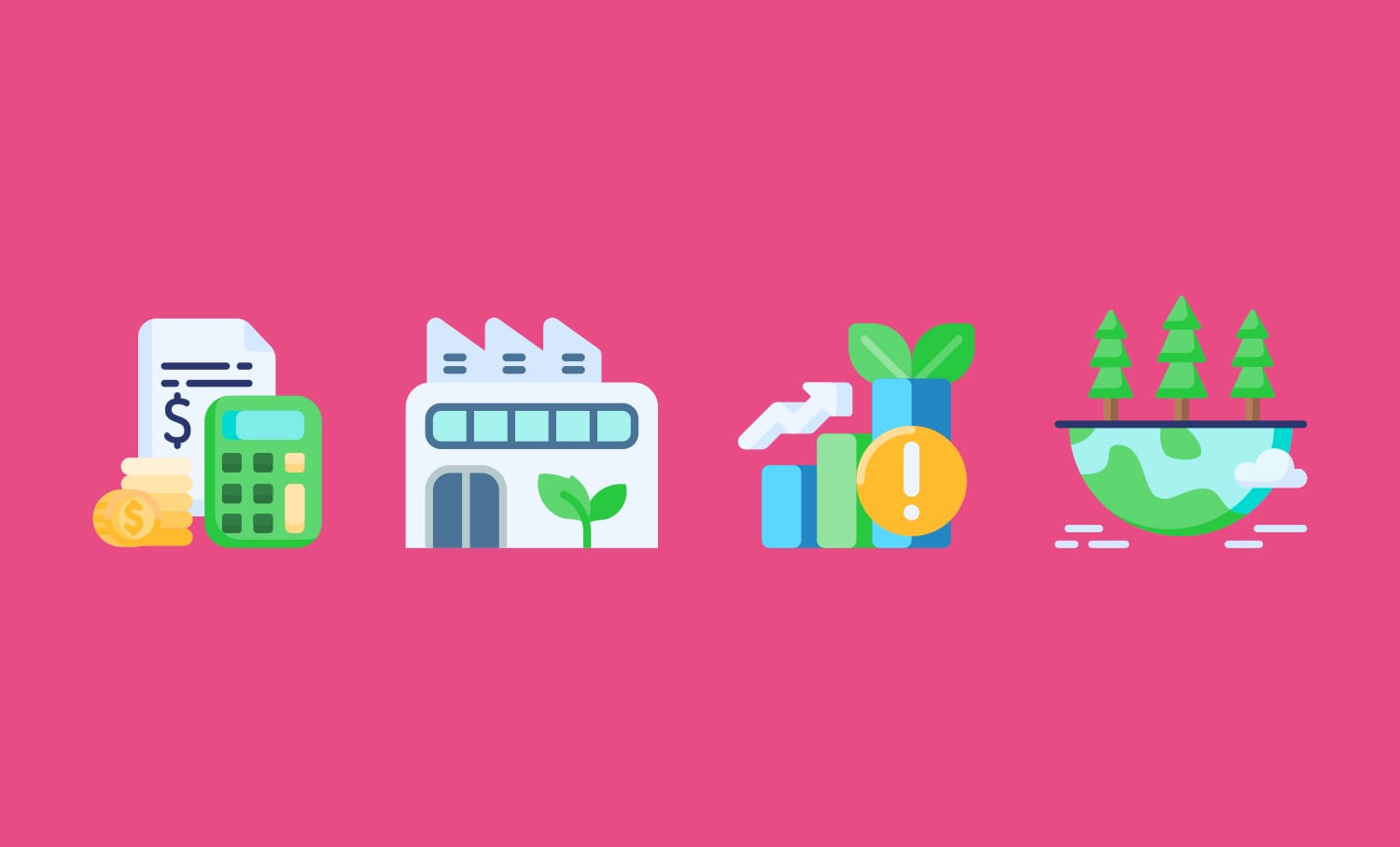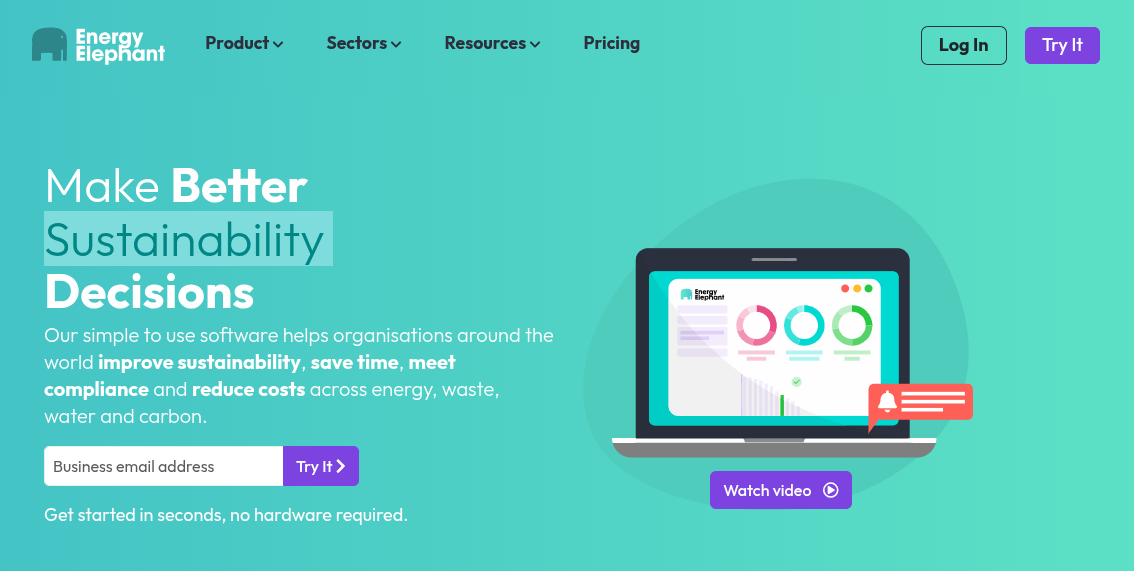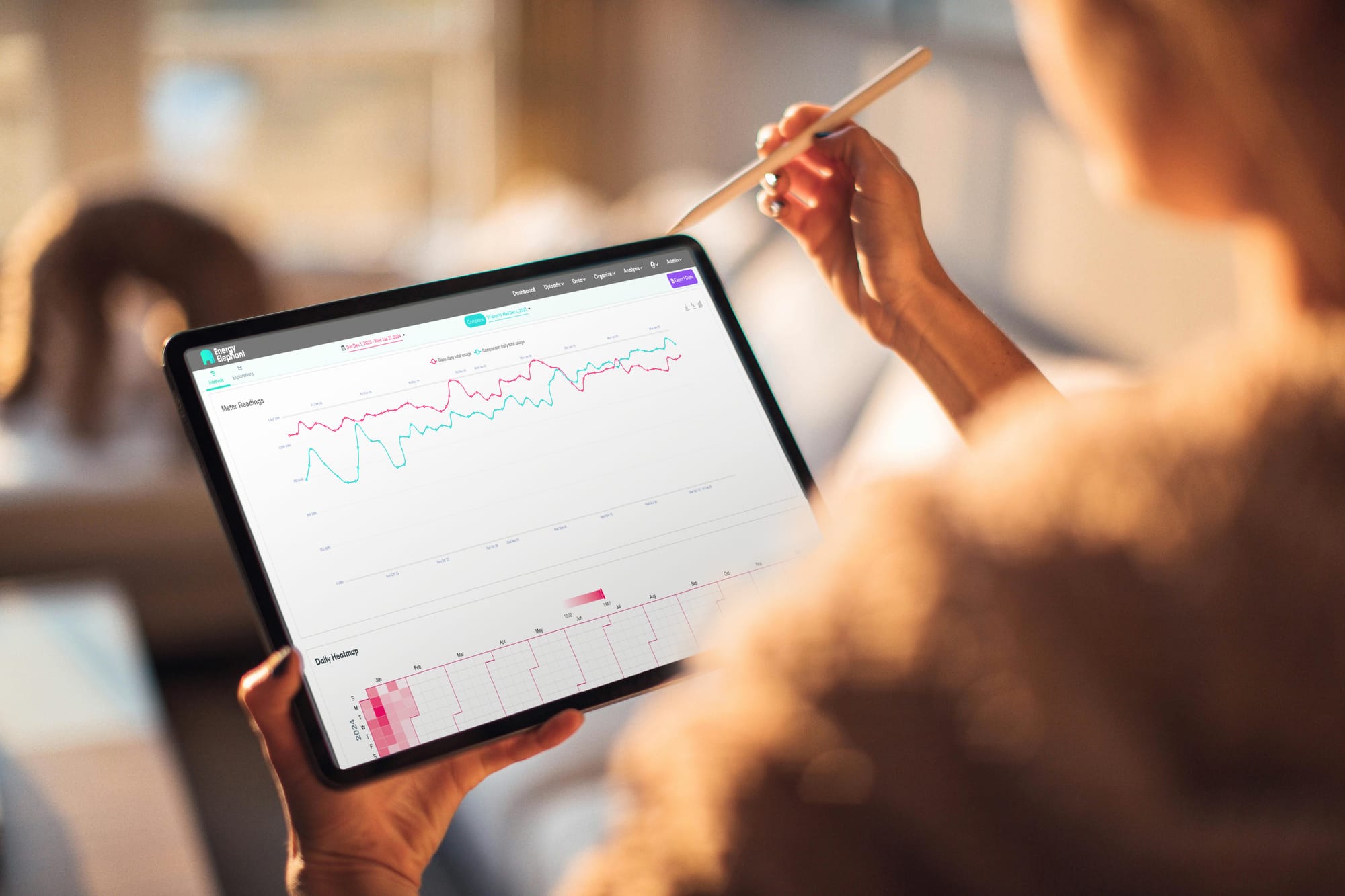Top 8 sustainability management software tools in 2025
A roundup of the best sustainability management platforms on the market today, with tips for evaluating similar product offerings, and advice on how to create a shortlist of software vendors.

In this article, we'll be highlighting some of the best sustainability management software tools on the market today. We will also explain the return-on-investment (ROI) for sustainability software, provide a few tips for evaluating similar product offerings, and show you how to create a shortlist of software vendors to choose the most suitable solution for your unique business needs.
What is sustainability management software?
Sustainability management software monitors resource use (e.g. energy and water), carbon emissions, and other key environmental data points. It integrates with all of the necessary resource monitoring infrastructure (metering and equipment), as well as existing organisational IT management software, acting as a third party that plugs in and gathers data from the systems already in place.
While government agencies use sustainability software tools to monitor environment data trends over time and measure the impact of emissions on climate, organisations subject to regulatory compliance for emission standards typically rely on this software as part of a larger ESG (Environmental, Social, and Governance) strategy. Because sustainability management software tends to overlap in features with energy management software, it’s not uncommon for organisations concerned with regulatory compliance to utilise both types of software.
ROI for sustainability management software
Sustainability software extends beyond environmental gains to include financial, operational, and reputational benefits. A fit-for-purpose sustainability management tool will help you:
- Reduce Energy Consumption: By identifying and implementing energy-saving strategies to reduce costs and environmental impact.
- Achieve Sustainability Goals: By tracking and reducing carbon emissions, supporting sustainability initiatives.
- Boost Operational Efficiency: By automating data collection, reporting, and compliance tasks, saving time and reducing manual errors.
- Enhance Decision-Making: By gaining data-driven insights to make informed decisions related to energy consumption and building management.
- Ensure Compliance: By adhering to local and global regulations, avoiding costly penalties or missed deadlines.
- Mitigate Risk: By identifying and addressing ESG-related risks proactively, minimising disruptions or reputational harm.
- Access Capital: By attracting ESG-focused investors and opening doors to green financing opportunities.
- Build Stakeholder Trust: By demonstrating a commitment to sustainability, boosting confidence among stakeholders, including investors, customers, and employees.
- Strengthen Brand Value: By positioning the organisation as a leader in sustainability, improving public perception and customer loyalty.
Tips for evaluating similar product offerings
The fact is, there is no one sustainability software solution that will be suitable for all users. Just like there is no panacea for all corporate ESG issues. There are, however, certain things you can look out for during the research/buying process to quickly narrow down your options and find the product best suited to your needs:
- Focus on the MVP: Ask vendors to demonstrate a Minimum Viable Product (MVP) tailored to your core needs. This allows you to quickly assess the software's functionality, usability, and alignment with your specific requirements without a significant upfront investment.
- Iterative Evaluation: Ask vendors to showcase their development process and how they incorporate user feedback. Look for a commitment to ongoing improvement and iteration based on user input. This ensures the software evolves to meet your changing needs and incorporates valuable features over time.
- Prioritise Value: Instead of solely focusing on a comprehensive feature set, clearly define the core value you seek from the software. Evaluate vendors based on their ability to deliver that value efficiently and effectively, even if it means starting with a simpler solution with stronger support. This helps avoid feature bloat and ensures the software directly addresses your critical business challenges.
- Testing and Validation: Request trials or demos that allow you to test the software with real-world scenarios relevant to your business. This provides valuable insights into the software's performance, usability, and ability to deliver the promised value.
- Transparency and Feedback: Prioritise vendors who are transparent about their development process, limitations, and future roadmap. Look for vendors who actively solicit and incorporate user feedback, demonstrating their commitment to continuous improvement and customer satisfaction. This approach aligns with the lean start-up methodology of ‘validated learning’, ensuring the chosen software evolves to meet your needs over time.
Below is a shortlist of eight vendors you should be considering for your sustainability software management needs in 2025.
1. EnergyElephant

EnergyElephant was established in 2015 and is headquartered in Dublin, Ireland.
Key Features and Capabilities: EnergyElephant’s multi-award-winning cloud-based platform provides an all-in-one solution for both Energy SaaS (including waste, recycling, and water stewardship) and carbon/ESG reporting. The software uses automation, AI, and analysis technologies to help organisations create, store, organise, analyse, report, and act on all of their energy, water, waste, and carbon data in one central, searchable, and secure location. It enables uploading and validation of utility bills, invoices, and spreadsheets, providing executive-level insights in minutes. EnergyElephant can also automate the process of importing new bills/data for larger users. The platform supports access to real-time IoT sensors and sub-metering systems from multiple country/region data sources, to provide live views and analyses. It also supports numerous methodologies to provide best-in-class accuracy in carbon footprints based on actual energy use and grid-associated carbon and greenhouse gas (GHG) emissions at the time of use (Scope 1, Scope 2, and Scope 3). Easy-to-use, audit-ready reporting tools ensure data is compliant with international protocols and frameworks, including supporting: B Corp, CDP, CSRD, Energy Star, ERIC, GRESB, Greenhouse Gas Protocol, ISO 14001, ISO 50001, SBTi, SECR, and more.
Transparent Pricing? Yes. EnergyElephant offers flexible pricing plans for Small, Medium, Large, and Enterprise customers, with premium customer support and quarterly review calls as standard. Click on the button below to check out platform pricing, as well as price points for example organisations.
Free Trial Offered? Yes. EnergyElephant offers a free 14-day trial and/or a three-month Proof of Value (PoV), so you can make sure the system meets your requirements before making any significant financial commitment. The team also provides free switching/transition support to help move your organisation from an existing system over to EnergyElephant quickly and seamlessly. It typically takes less than a month to initialise all data and onboard the team. The significant amount of data provided by the system can then be used to decide if/where expensive hardware needs to be deployed later.

2. Watershed
Watershed was established in 2019 and is headquartered in San Francisco, California.
Key Features and Capabilities: Watershed's platform offers a suite of tools designed to assist organisations in effectively managing their environmental impact. By leveraging a global database, it provides detailed emissions data, enabling businesses to accurately assess their carbon footprint. The platform includes robust reporting tools that ensure compliance with various regulatory requirements, delivering investor-grade, audit-ready ESG and climate reports. It also supports organisations in setting targets, modelling, and reducing emissions through strategic decision-making regarding materials, suppliers, and operational practices. Additionally, Watershed offers access to a curated selection of carbon removal and clean power projects, allowing organisations to invest in high-impact decarbonisation initiatives.
Transparent Pricing? No. Watershed does not publish their pricing online.
Free Trial Offered? No.
3. EnergyCAP
EnergyCAP was established in 1980 and is headquartered in Boalsburg, Pennsylvania.
Key Features and Capabilities: EnergyCAP is an energy management and sustainability software platform that enables organisations to monitor, analyse, and report their energy consumption and environmental impact. The platform streamlines data collection through automated imports and API integrations, ensuring accurate and timely information. Its Chargeback feature allows precise allocation of energy costs to specific departments or tenants, enhancing accountability. Users can assess performance and identify improvement areas through tools for normalisation, benchmarking, and energy use intensity analysis. Additionally, EnergyCAP supports comprehensive sustainability tracking, including GHG emissions and water usage, facilitating informed decision-making and regulatory compliance.
Transparent Pricing? No. EnergyCAP does not publish their pricing online.
Free Trial Offered? No.
4. CoolPlanet
CoolPlanet was established in 2012 and is headquartered in Enniskerry, Ireland.
Key Features and Capabilities: CoolPlanet's sustainability software platform delivers real-time analytics on energy consumption and carbon emissions, enabling businesses to make informed decisions to optimise energy use and reduce environmental impact. By integrating with existing systems, it captures live operational data, facilitating immediate analysis of cost and emissions implications. The platform supports modelling and scenario planning, allowing users to predict outcomes and assess potential changes. It offers enterprise-wide visibility, enabling organisations to monitor progress towards decarbonisation goals and benchmark performance across multiple sites.
Transparent Pricing? No. CoolPlanet does not publish their pricing online.
Free Trial Offered? No.
5. Deepki
Deepki was established in 2014 and is headquartered in Paris, France.
Key Features and Capabilities: Deepki's platform enhances real estate portfolio management by facilitating the energy transition through data-driven insights. It automatically collects and consolidates data from diverse sources, offering a comprehensive view of assets to identify and address anomalies. The platform supports the development of collaborative action plans, enabling stakeholders to define sustainability initiatives, evaluate their financial impacts, and monitor implementation progress. Additionally, Deepki's ESG Index provides insights into the sustainability performance of real estate assets, assisting organisations in enhancing asset value and improving ESG performance.
Transparent Pricing? No. Deepki does not publish their pricing online.
Free Trial Offered? No.
6. Spacewell Energy (Dexma)
Spacewell Energy (Dexma) was established in 2007 and is headquartered in Barcelona, Spain.
Key Features and Capabilities: Spacewell Energy (Dexma) offers a cloud-based AI platform that integrates Big Data analytics with energy efficiency to help facility managers, energy auditors, and building owners detect, analyse, and optimise energy consumption and costs, while promoting sustainability. The platform supports over 150 data sources, enabling comprehensive energy consumption insights. It provides real-time monitoring through intuitive dashboards, AI-driven anomaly detection, remote control of building systems, accurate cost allocation based on time-of-use tariffs, real-time savings verification, automated reporting, and an Energy Apps Market for customisable functionality.
Transparent Pricing? No. Spacewell Energy (Dexma) does not publish their pricing online.
Free Trial Offered? No.
7. Measurabl
Measurabl was established in 2013 and is headquartered in San Diego, California.
Key Features and Capabilities: Measurabl is a comprehensive platform that automates the synchronisation and centralisation of ESG data from diverse sources, ensuring data integrity through automated anomaly detection. It facilitates direct syncing of utility data, enabling users to set and monitor sustainability targets effectively. Users can track historical environmental performance metrics, utility costs, projects, audits, and certifications, supporting informed decision-making. Measurabl allows for the establishment of both broad and detailed sustainability goals, tracking progress over time to ensure alignment with organisational objectives. The platform generates investment-grade sustainability reports, aiding in compliance with global ESG reporting standards and frameworks. Additionally, it provides instant access to physical climate risk information about portfolios. Measurabl Navigate, a suite of products leveraging the Quantum Cloud, aggregates various data points to enhance disclosure and stakeholder reporting.
Transparent Pricing? No. Measurabl does not publish their pricing online.
Free Trial Offered? No.
8. Sweep
Sweep was established in 2020 and is headquartered in Paris, France.
Key Features and Capabilities: Sweep offers a comprehensive platform that enables businesses to monitor and manage their carbon emissions and ESG data. The software allows organisations to measure their carbon footprint by collecting data through survey templates, facilitating accurate tracking of GHG emissions across various operations. It provides visualisation tools to see emissions data in one place and analyses reliable data to eliminate duplicates, errors, or inconsistencies. Sweep also helps organisations involve their suppliers in their sustainability strategy to achieve joint goals. The platform assists in complying with the latest disclosure rules, ensuring that businesses meet regulatory requirements related to sustainability reporting. It offers real-time dashboards to monitor compliance progress, which helps mitigate ESG risks and avoid potential fines.
Transparent Pricing? No. Sweep does not publish their pricing online.
Free Trial Offered? No.
Creating a shortlist of software vendors

Selecting a sustainability management software solution requires collaboration across departments, from Finance to Operations, as compliance with international protocols and frameworks, such as the CSRD (Corporate Sustainability Reporting Directive) requires increasing cross-functional dependencies.
Shortlisting helps streamline the selection process. Here are some final recommendations to help you choose the right vendor for your needs:
- Engage All Stakeholders: To fully understand the scope of each team’s responsibilities in alignment with the organisation’s ESG goals.
- Identify Pain Points: Document the specific problems or inefficiencies the software should address, e.g. limitations of spreadsheets, data lakes, and legacy systems.
- Define Needs: Any system you implement should connect to other systems where data already exists, but also allow for file upload and manual data entry. Ensure the software can be tailored to fit your organisation’s workflows and requirements.
- Read Reviews: Both G2 and Capterra provide verified user reviews.
- Trial and Feedback: Test the software through demos or trials, and gather feedback from relevant stakeholders.
- Vendor Stability: Choose a reputable vendor with a track record of reliable support before making a final decision.